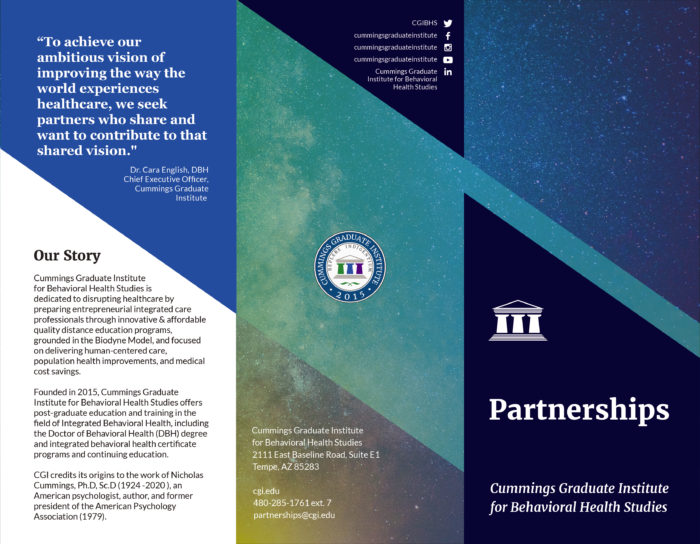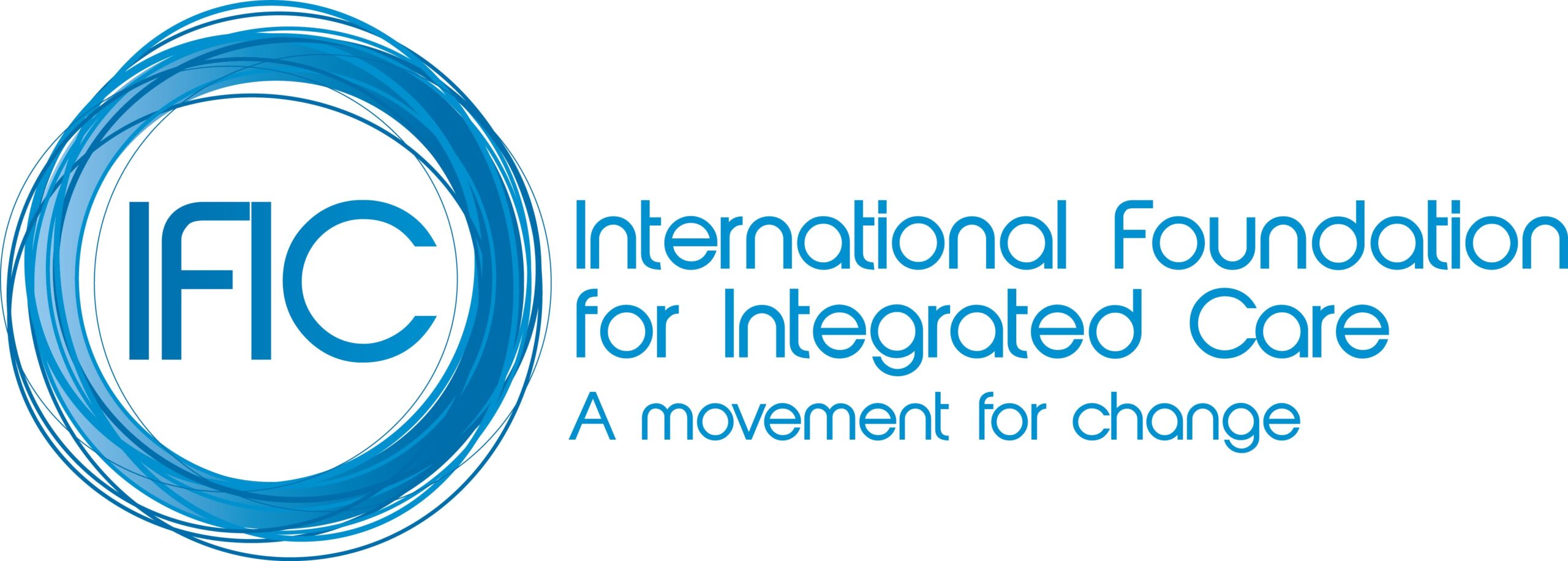CGI welcomes new partnerships with organizations dedicated to advancing awareness and education of integrated behavioral healthcare.

Partnership Levels
We offer four avenues to partner with us to advance our mission, vision, and values:
Collaborate
Join forces with CGI to develop, launch, redesign, or increase awareness of an integrated care or integrated behavioral health model, service, or product within your organization.

Partner
Join together with CGI to gain access to high quality integrated behavioral health education and training for your organization. CGI partners can gain access to exclusive tuition benefits, custom courses, and training packages. Learn more about Tuition Assistance Education Partnerships.

Promote
Love what CGI stands for? Be a champion of our institution by sharing CGI’s offerings with your network.

Support
Contribute to the education and advancement of future Doctors of Behavioral Health by donating to our institution scholarship fund. 100% of your donations go towards student scholarships. Click here to donate now.

Our Advantage
As a lean and nimble organization, we are able to develop customized approaches, tailored to an institute or organization’s specific needs and provide onsite evaluations to help launch or advance integrated care efforts and adoption.
Dr. Cara English, CEO of Cummings Graduate Institute, speaks to the value of partnering with CGI.
How to Partner with Us
First, let us know how you’d like to partner with us by emailing partnerships@cgi.edu or calling 480-285-1761 Ext. 7.
We will then contact you to discuss next steps.
Both domestic and international partnerships are welcome!
Download our Partnership Brochure.
Happiness is partnering with those who share our vision to change the way the world experiences healthcare. We look forward to welcoming you as our next partner!
Our Partners
CGI is proud to partner with the following organizations.
The International Foundation for Integrated Care seeks to advance the the science, knowledge, and adoption of integrated care policy and practice through the development and exchange of ideas among academics, researchers, managers, clinicians, policy makers, and users and carers of services throughout the World.
Hands To Guide You is an integrated, behavioral healthcare practice located in Oklahoma City, OK. Led by Dr. Larry Ford, Doctor of Behavioral Health (DBH) and Licensed Behavioral Health Professional (LBHP) whose mission and focus is to improve the way the world experiences healthcare is passionate about helping patients realize their full potential by successfully treating and resolving behavioral health deficiencies.
The Behavior Web offers training in Applied Behavior Analysis and consulting on practical behavioral approaches to improve the standard of care and empower all professionals who provide behavioral services. Our procedures range from the use of large-scale Behavioral Economics strategies to person-centered, trauma-informed individualized plans.
Advancing Integrated Health’s mission is to seamlessly integrate physical, mental, and social health by collaborating with healthcare payers, providers, patients, healthcare technology experts, policymakers, and pharmaceutical therapists. They provide real-world experience and insight through comprehensive training and consulting services to enhance your organization’s effectiveness and efficiency in delivering sustainable integrated services. They offer resources, tools, and support for mental health and primary care, specialty medicine providers, safety-net organizations, and states to integrate primary and mental health care.
Clinical Best Practice Institute LLC is a practice founded by Patricia Dobratz, JD, LMFT to provide support and consultative services to behavioral health professionals. Patricia’s education and professional background spans the fields of law, behavioral health, and academia. She has practiced as a Licensed Marriage and Family Therapist in various settings including schools, private practice, outpatient clinics, and integrated healthcare facilities. In addition, she has held Clinical Supervisor, Director, and Vice President positions providing support and leadership to behavioral health teams of interns, associates, independently licensed professionals, and supervisors. Patricia is passionate about supporting others and upholding the integrity of the behavioral health field. She has provided clinical supervision, facilitated trainings, and taught at several universities for over ten years, in an effort to help others translate best practices from textbook to practice. Patricia has served on the Arizona Division of the American Association for Marriage and Family Therapy. In addition, she has served on the Arizona Board of Behavioral Health Examiners as a Professional Member and most recently as Chairperson. The Clinical Best Practice Institute’s mission is to support behavioral health professionals and organizations through trainings, supervision, and consultations.
Healthy Mind Int. PTY LTD, is a client center focused on mental health clinical services. Healthy Mind Int. views the mental health of clients as not solely related just to the individual, but also linked to the environmental and social nexus that intersects the individual’s life. Understanding all elements of the client’s life and the relevant impacts both positive and negative are essential to ensuring they can individually tailor focused psychological therapies to the clients presentations. Guiding and advising while teaching their clients to help themself is their ultimate goal aligned with improvement of mental health overall. Healthy Mind Int. PTY LTD, operates 4 clinics in Australia with two providing mental health services to country and regional clients.
Chiricahua Community Health Centers, Inc. (CCHCI), is a mission-driven Federally Qualified Health Center [tax exempt not-for-profit 501(c)3] founded as a grassroots community effort in 1996. Beginning as a makeshift clinic in a rural town’s small community center, CCHCI has grown to be the largest primary care organization in southeastern Arizona.






































